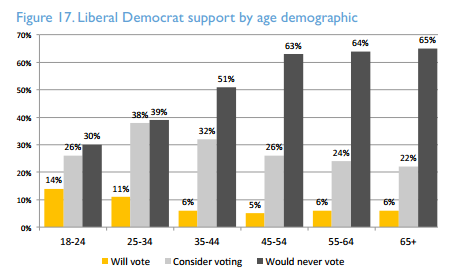Major new research into British voters has important lessons for Liberal Democrats
Out today is a major piece of political research by British Future, its fourth State of the Nation annual report using polling by the ‘gold standard’ firm ICM. It points to one key strategic lesson and one key tactical lesson for the Liberal Democrats.
But first, some optimism about the wider cause of liberalism:
Britain today is a considerably more liberal country than it was in the 1950s, 1980s or even in the 1990s. Whatever their party colours, any politician who seeks to appeal primarily to pessimism in modern Britain is likely to find themselves on the wrong side of important social changes, such as rising education and a big generation shift towards more confidence about the diverse society we have become.
What’s more:
Young voters of today are a liberal generation, even more so in fact than the young voters of the past.
Turning to the Liberal Democrats specifically, the polling by ICM sets out the strategic context for the party’s general election campaign:
The general public mood towards the Liberal Democrats would be better characterised as indifference rather than loathing. Nick Clegg may have struggled to make Coalition a positive virtue in the British political culture, but four out of ten people wouldn’t mind if his party were in government again … the Liberal Democrats [need] to make the case that a party prepared to make compromises in power can be an effective champion of liberal values.
The difference between indifference and loathing is vital because loathing means no chance of getting someone’s vote, but indifference opens up the opportunity of a persuasive and popular candidate (incumbent Lib Dem MPs and a select band of well-established candidates hoping to win for the first time) to turn national indifference into constituency votes. For more on how to do that, see my Liberal Democrat Newswire #53: How to fix the Lib Dem strategy.
Turning to tactics, the key lesson from this research is that targeting younger voters is still a good approach for the Liberal Democrats. Matching finding from other polling which regularly finds the Liberal Democrats more popular with younger voters than with other voters, State of the Nation 2015 finds that:
The Liberal Democrats may also be pleasantly surprised by the small number of ‘never’ voters among the 18-24s. While the ‘great betrayal’ on tuition fees arguably had a far greater effect upon 2015’s first time voters than any other group, the 18-24s are significantly more forgiving than the rest of the electorate, with only 30% saying they would never vote for the Liberal Democrats, compared to an average of 53% across the country.

That 53% in the quote is the same as for the Greens and higher than that for Labour, Conservatives and Ukip, though it is worth noting that the party which comes out best, Labour, is still as high as 38%.
The gap between the current Liberal Democrat assessment in the eyes of the electorate and one which would make the party one of the best placed is of a size that a recovery in the party’s fortunes does not have to be seen as something many years away.
Leave a Reply